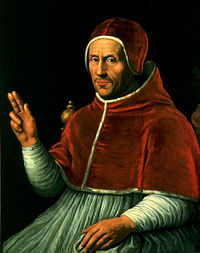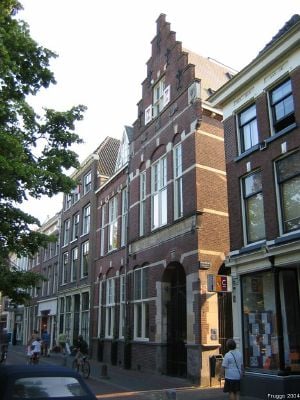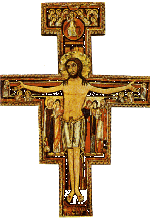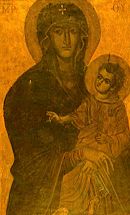| Adrian VI
|

|
| Birth name
|
Adriaan Florenszoon Boeyens
|
| Papacy began
|
January 9, 1522
|
| Papacy ended
|
September 14, 1523
|
| Predecessor
|
Leo X
|
| Successor
|
Clement VII
|
| Born
|
March 2 1459(1459-03-02)
Utrecht, Holy Roman Empire
|
| Died
|
September 14 1523 (aged 64)
Rome, Papal States
|
| Other popes named Adrian
|
Pope Adrian VI (Utrecht, March 2, 1459 – September 14, 1523), born Adriaan Florenszoon Boeyens, served as Bishop of Rome from 9th January 1522 until his death some 18 months later. He was the last non-Italian pope until John Paul II, 456 years later. He is, together with Marcellus II, one of two 'modern' popes to retain his baptismal name after election. He is buried in the German national church in Rome, Santa Maria dell'Anima. He is the only Dutchman to have become pope.
He was born Adriaan Florisz Boeyens under modest circumstances in the city of Utrecht, which was then the capital of the bishopric of Utrecht, the Netherlands. He was the son of Floris/Florens Boeyens van Utrecht, also born in Utrecht, and his wife Gertruid. Utrecht was at that time part of the Holy Roman Empire of the German Nation. In Germany Adrian is sometimes considered a German pope, as the Holy Roman Empire was largely inhabited by Germans, but especially because of the nationalist influence of the 19th century. His nationality (not ethnicity, which was undoubtly Dutch) more accurately was that of an 'imperial subject' rather than 'German'. Nevertheless 'German' is often used as the demonym of the Holy Roman Empire, though not always correctly.[1]
Adrian VI was known for having attempted to launch a Catholic Reformation (or counter reformation) as a response to the Protestant Reformation. His efforts were fruitless as they were ignored by most of his Renaissance ecclesiastical contemporaries and his tenure as pope was too brief to make a lasting impression.
Early life
Adrian was probably born in a house on the corner of the Brandsteeg and Oude Gracht that was owned by his grandfather Boudewijn (Boeyen for short). His father, a carpenter and likely shipwright, died when Adrian was 10 years or younger.[2] Adrian VI studied from a very young age under the Brethren of the Common Life, either at Zwolle or Deventer and was also a student of the Latin school (now Gymnasium Celeanum) in Zwolle.[3]. In June 1476, he started his studies at the University of Louvain, where he pursued philosophy, theology and Canon Law, due to a scholarship granted by Margaret, Duchess of Burgundy, becoming a Doctor of Theology in 1491, Dean of St. Peter's and vice-chancellor of the university. His lectures were published, as recreated from his students' notes; among those who attended was the young Erasmus.
Early career
In 1507 he was appointed tutor to Emperor Maximilian I's (1493 – 1519) seven year old grandson, Charles, who was later to become Emperor Charles V (1519 – 56). In 1515 Adrian was sent to Spain on a diplomatic errand, and after his arrival at the Imperial Court in Toledo, Charles V secured his succession to the See of Tortosa, and on 14 November 1516 commissioned him Inquisitor General of Aragon. The following year, Pope Leo X (1513 – 21) created Adrian a cardinal, naming him Cardinal Priest of the Basilica of Saints John and Paul.

Pope Adrian VI's birthplace in Utrecht
During the minority of Charles V, Adrian was named to serve with Francisco Cardinal Jimenez de Cisneros as co-regent of Spain. After the death of the Jimenez, Adrian was appointed (14 March 1518) General of the Reunited Inquisitions of Castile and Aragon, in which capacity he acted until his departure for Rome. During this period, Charles V left for the Netherlands in 1520, making the future pope Regent of Spain, during which time he had to deal with the Revolt of the Comuneros.
Election as Bishop of Rome
In the conclave after the death of the Medici Pope Leo X, his cousin, Cardinal Giulio de' Medici was the leading figure. With Spanish and French cardinals in a deadlock, the absent Adrian was proposed as a compromise and on January 9, 1522 he was elected by an almost unanimous vote. Charles V was delighted upon hearing that his tutor had been elected to the papacy but soon realised that Adrian VI was determined to reign impartially. Francis I of France, who feared that Adrian would become a tool of the Emperor, and had uttered threats of a schism, later relented and sent an embassy to present his homage. Fears of a Spanish Avignon based on the strength of his relationship with the Emperor as his former tutor and regent proved baseless, and Adrian left for Italy at the earliest opportunity, making his solemn entry into Rome on 29 August. He was crowned in St. Peter's Basilica on the 31 August 1522, at the age of sixty-three and immediately entered upon the path of the reformer. The 1908 edition of the Catholic Encyclopedia characterised the task that faced him:
- "To extirpate inveterate abuses; to reform a court which thrived on corruption, and detested the very name of reform; to hold in leash young and warlike princes, ready to bound at each other's throats; to stem the rising torrent of revolt in Germany; to save Christendom from the Turks, who from Belgrade now threatened Hungary, and if Rhodes fell would be masters of the Mediterranean—these were herculean labours for one who was in his sixty-third year, had never seen Italy, and was sure to be despised by the Romans as a 'barbarian'.[4]
His plan was to attack notorious abuses one by one; but in his attempt to improve the system of indulgences he was hampered by his cardinals; and he found reducing the number of matrimonial dispensations to be impossible as the income had been farmed out for years in advance by Pope Leo X.
Pope
The Italians saw in him as a pedantic foreign professor, blind to the beauty of classical antiquity. Musicians such as Carpentras, the composer and singer from Avignon who was master of the papal chapel under Leo X, left Rome due to Adrian VI's indifference to the arts.
Adrian was not successful as a peacemaker among Christian princes, whom he hoped to unite in a war against the Turks. In August 1523 he was forced into an alliance with the Empire, England, Venice, against France; meanwhile in 1522 the Sultan Suleiman I (1520 – 66) had conquered Rhodes.
In his reaction to the early stages of the Lutheran revolt, Adrian VI did not completely understand the gravity of the situation. At the Diet of Nuremberg which opened in December 1522 he was represented by Francesco Chiericati, whose private instructions contain the frank admission that the disorder of the Church was perhaps the fault of the Roman Curia itself, and that it should be reformed. However, the former professor and Inquisitor General was strongly opposed to any change in doctrinal, and demanded that Luther be punished for teaching heresy.
The statement in one of his works that a pope may err, privately or in a minor decree, including matters of faith, attracted attention. Catholics claim that it was a private opinion, not an official pronouncement and therefore does not conflict with the dogma of papal infallibility. Catholic apologists point to the fact that Adrian VI merely theoreticised about the issue.
Death
Adrian VI died on 14 September 1523, after a somewhat brief tenure. Most of his official papers were lost after his death. He published Quaestiones in quartum sententiarum praesertim circa sacramenta (Paris, 1512, 1516, 1518, 1537; Rome, 1522), and Quaestiones quodlibeticae XII. (1st ed., Leuven, 1515).
Italian writer Luigi Malerba used the confusion among the leaders of the Catholic Church, which was created by Adrian's unexpected election, as backdrop for his 1995 novel, Le maschere (The Masks), about the struggle between two Roman cardinals for a well-endowed church office.
See also
- Pasquinade
- The Tragical History of Doctor Faustus
Notes
- ↑ pag 71, Adrianus VI De Nederlandse paus by J. Bijloos. (covers entire paragraph)
- ↑ Gerard Weel Life and times of Adrian of Utrecht (in Dutch)
- ↑ Coster, Wim. Metamorfoses. Een geschiedenis van het Gymnasium Celeanum, 2003. Zwolle: Waanders, Dutch. ISBN90-400-8847-0 pages 17 and 19, chapter "De Latijnse School te Zwolle"
- ↑ Catholic Encyclopedia (1908)
References
ISBN links support NWE through referral fees
- Luther Martin. Luther's Correspondence and Other Contemporary Letters, 2 vols., tr.and ed. by Preserved Smith, Charles Michael Jacobs, The Lutheran Publication Society, Philadelphia, Pa. 1913, 1918. vol.I (1507-1521) and vol.2 (1521-1530) from Google Books. Reprint of Vol.1, Wipf & Stock Publishers (March 2006). ISBN 1-59752-601-0
- Gross, Ernie. This Day In Religion. New York:Neal-Schuman Publishers, Inc, 1990. ISBN 1-55570-045-4.
- Malerba Luigi. e maschere, Milan: A. Mondadori, 1995. ISBN 88-04-39366-1
External links
Wikimedia Commons has media related to:
| Popes of the Catholic Church |
|---|
| | |
Boniface V
Honorius I
Severinus
John IV
Theodore I
Martin I
Eugene I
Vitalian
Adeodatus II
Donus
Agatho
Leo II
Benedict II
John V
Conon
Sergius I
John VI
John VII
Sisinnius
Constantine
Gregory II
Gregory III
Zachary
Stephen II
Paul I
Stephen III
Adrian I
Leo III
Stephen IV
Paschal I
Eugene II
Valentine
Gregory IV
Sergius II
|
Leo IV
Benedict III
Nicholas I
Adrian II
John VIII
Marinus I
Adrian III
Stephen V
Formosus
Boniface VI
Stephen VI
Romanus
Theodore II
John IX
Benedict IV
Leo V
Sergius III
Anastasius III
Lando
John X
Leo VI
Stephen VII
John XI
Leo VII
Stephen VIII
Marinus II
Agapetus II
John XII
Leo VIII
Benedict V
John XIII
Benedict VI
Benedict VII
John XIV
|
John XV
Gregory V
Sylvester II
John XVII
John XVIII
Sergius IV
Benedict VIII
John XIX
Benedict IX
Sylvester III
Benedict IX
Gregory VI
Clement II
Benedict IX
Damasus II
Leo IX
Victor II
Stephen IX
Nicholas II
Alexander II
Gregory VII
Victor III
Urban II
Paschal II
Gelasius II
Callixtus II
Honorius II
Innocent II
Celestine II
Lucius II
Eugene III
Anastasius IV
Adrian IV
Alexander III
|
Lucius III
Urban III
Gregory VIII
Clement III
Celestine III
Innocent III
Honorius III
Gregory IX
Celestine IV
Innocent IV
Alexander IV
Urban IV
Clement IV
Gregory X
Innocent V
Adrian V
John XXI
Nicholas III
Martin IV
Honorius IV
Nicholas IV
Celestine V
Boniface VIII
Benedict XI
Clement V
John XXII
Benedict XII
Clement VI
Innocent VI
Urban V
Gregory XI
Urban VI
Boniface IX
Innocent VII
|
Gregory XII
Martin V
Eugene IV
Nicholas V
Callixtus III
Pius II
Paul II
Sixtus IV
Innocent VIII
Alexander VI
Pius III
Julius II
Leo X
Adrian VI
Clement VII
Paul III
Julius III
Marcellus II
Paul IV
Pius IV
Pius V
Gregory XIII
Sixtus V
Urban VII
Gregory XIV
Innocent IX
Clement VIII
Leo XI
Paul V
Gregory XV
Urban VIII
Innocent X
Alexander VII
Clement IX
|
Clement X
Innocent XI
Alexander VIII
Innocent XII
Clement XI
Innocent XIII
Benedict XIII
Clement XII
Benedict XIV
Clement XIII
Clement XIV
Pius VI
Pius VII
Leo XII
Pius VIII
Gregory XVI
Pius IX
Leo XIII
Pius X
Benedict XV
Pius XI
Pius XII
John XXIII
Paul VI
John Paul I
John Paul II
Benedict XVI
Francis
|
| | | Currently: Francis |
|
| Catholic Church |
|---|
| | Organizations, Papacy, Teachings and Liturgical Traditions | | | History | |  | | | Hierarchy | Pope · Cardinals · Patriarchs · Major Archbishops · Primates · Metropolitans · Archbishops · Diocesan Bishops | | | Theology | | | | Sacraments | Baptism · Confirmation · Eucharist · Penance · Anointing of the Sick · Holy Orders · Matrimony | | | Mariology | Mariology · Veneration · History of Mariology · Mariology of the saints · Mariology of the popes · Marian Doctrines · Mother of God · Perpetual Virginity · Immaculate Conception · Assumption | | Doctors of
the Church | | | | Pope Benedict XVI | Conclave · Theology · Works · Deus Caritas Est · Sacramentum Caritatis · Summorum Pontificum · Spe Salvi | | | Preceding Popes | | | | Orders & Societies | Assumptionist · Augustinian Order · Benedictines · Capuchin Order · Carmelites · Carthusians · Congregations of Holy Cross · Dominican Order · Franciscan orders · Jesuits · Oratory of Saint Philip Neri | | | Vatican II | | | Particular Churches
sorted by
Liturgical Traditions | Alexandrian · Coptic · Ethiopic · Antiochian · Maronite · Syriac · Syro-Malankara · Armenian · Armenian ·Byzantine · Albanian · Belarusian · Bulgarian · Croatian · Greek · Hungarian · Italo-Greek · Macedonian · Melkite · Romanian · Russian · Ruthenian · Slovak · Ukrainian · East Syrian · Chaldean · Syro-Malabar · Roman · Ambrosian · Sarum · Mozarabic · Anglican Use · Latin · Priestly Fraternity of St. Peter | |  Pope Portal Pope Portal  Catholicism Portal Catholicism Portal |
|
| History of the Roman Catholic Church |
|---|
| | History of Roman Catholic Churches and rites including · Alexandrian · Armenian · Byzantine · West Syrian · Chaldean | | | General | History of the Roman Catholic Church · History of the Papacy · Ecumenical Councils · Timeline of the Roman Catholic Church · History of Christianity · Role of Roman Catholic Church in civilization · Art in Roman Catholicism · Roman Catholic religious order · Christian monasticism · Papal States |  | | | Church beginnings | | | Constantine to
Gregory the Great | | | | Early Middle Ages | | | | High Middle Ages | Pope Urban II ·Investiture controversy ·Crusades · First Council of the Lateran ·Second Council of the Lateran ·Third Council of the Lateran · Pope Innocent III ·Latin Empire of Constantinople ·Saint Francis of Assisi · Fourth Council of the Lateran · Inquisition · First Council of Lyons · Second Council of Lyons ·Bernard of Clairvaux ·Thomas Aquinas | | | Late Middle Ages | | | Reformation and
Counter Reformation | | | Baroque Period to
French Revolution | | | | 19th Century | | | | 20th Century | | | | 21st Century | Pope Benedict XVI ·World Youth Day 2008 |
|
Credits
New World Encyclopedia writers and editors rewrote and completed the Wikipedia article
in accordance with New World Encyclopedia standards. This article abides by terms of the Creative Commons CC-by-sa 3.0 License (CC-by-sa), which may be used and disseminated with proper attribution. Credit is due under the terms of this license that can reference both the New World Encyclopedia contributors and the selfless volunteer contributors of the Wikimedia Foundation. To cite this article click here for a list of acceptable citing formats.The history of earlier contributions by wikipedians is accessible to researchers here:
The history of this article since it was imported to New World Encyclopedia:
Note: Some restrictions may apply to use of individual images which are separately licensed.




